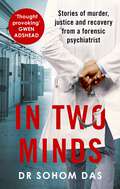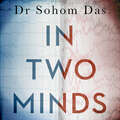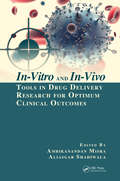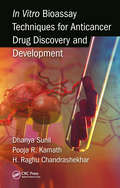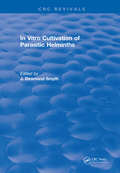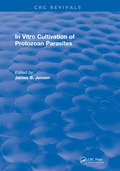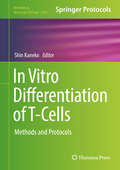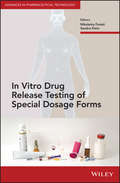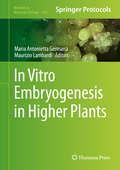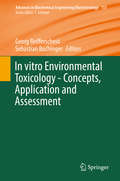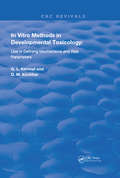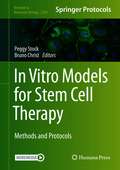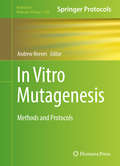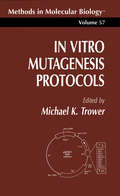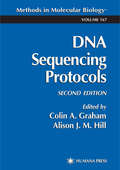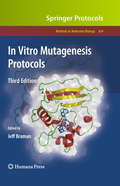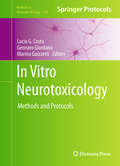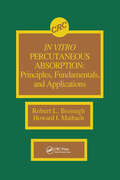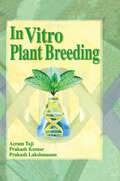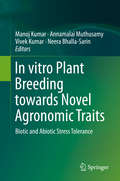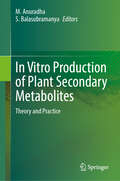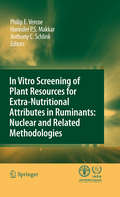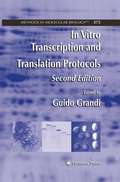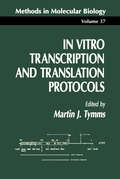- Table View
- List View
In Two Minds: Stories of murder, justice and recovery from a forensic psychiatrist
by Dr Sohom Das'thought provoking'Gwen AdsheadShocking, eye-opening and grimly fascinating, these are the true stories, patients and cases that have characterised a career spent treating mentally disordered offenders.As a forensic psychiatrist, it's Dr Das's job to treat and rehabilitate what the tabloids might call the 'criminally insane', many of whom assault, rob, rape, and even kill. His work takes him to high-security prisons and securely locked hospital wards across the country, as well as inside courtrooms, giving evidence as an expert witness.From the young woman who smothered her two-year-old nephew in a flash of psychosis, to the teenager who set his house on fire with his mother locked inside, Dr Das must delve into the minds of these violent offenders to elicit their symptoms of mental illness, understand their actions and prevent future atrocities.In this honest, revealing and at times humorous memoir, Dr Das shares stories from his fifteen years as a psychiatric doctor working with this dangerous clientele, detailing some of his most extreme, heart-breaking and bizarre cases - and how he's learned to live with his mistakes when the worse happens.Compelling, enlightening and candid, if you enjoyed Unnatural Causes, Dark Side of the Mind or The Prison Doctor, you'll love IN TWO MINDS.
In Two Minds: Stories of murder, justice and recovery from a forensic psychiatrist
by Dr Sohom Das'thought provoking'Gwen AdsheadShocking, eye-opening and grimly fascinating, these are the true stories, patients and cases that have characterised a career spent treating mentally disordered offenders.As a forensic psychiatrist, it's Dr Das's job to treat and rehabilitate what the tabloids might call the 'criminally insane', many of whom assault, rob, rape, and even kill. His work takes him to high-security prisons and securely locked hospital wards across the country, as well as inside courtrooms, giving evidence as an expert witness.From the young woman who smothered her two-year-old nephew in a flash of psychosis, to the teenager who set his house on fire with his mother locked inside, Dr Das must delve into the minds of these violent offenders to elicit their symptoms of mental illness, understand their actions and prevent future atrocities.In this honest, revealing and at times humorous memoir, Dr Das shares stories from his fifteen years as a psychiatric doctor working with this dangerous clientele, detailing some of his most extreme, heart-breaking and bizarre cases - and how he's learned to live with his mistakes when the worse happens.Compelling, enlightening and candid, if you enjoyed Unnatural Causes, Dark Side of the Mind or The Prison Doctor, you'll love IN TWO MINDS.
In Two Minds: Stories of murder, justice and recovery from a forensic psychiatrist
by Dr Sohom DasShocking, eye-opening and grimly fascinating, these are the true stories, patients and cases that have characterised a career spent treating mentally disordered offenders.Listen to the end of the audiobook for an exclusive bonus chapter, written and read by the author.As a forensic psychiatrist, it's Dr Das's job to treat and rehabilitate what the tabloids might call the 'criminally insane', many of whom assault, rob, rape, and even kill. His work takes him to high-security prisons and securely locked hospital wards across the country, as well as inside courtrooms, giving evidence as an expert witness.From the young woman who smothered her two-year-old nephew in a flash of psychosis, to the teenager who set his house on fire with his mother locked inside, Dr Das must delve into the minds of these violent offenders to elicit their symptoms of mental illness, understand their actions and prevent future atrocities.In this honest, revealing and at times humorous memoir, Dr Das shares stories from his fifteen years as a psychiatric doctor working with this dangerous clientele, detailing some of his most extreme, heart-breaking and bizarre cases - and how he's learned to live with his mistakes when the worse happens.Compelling, enlightening and candid, if you enjoyed Unnatural Causes, Dark Side of the Mind or The Prison Doctor, you'll love IN TWO MINDS.
In-Vitro and In-Vivo Tools in Drug Delivery Research for Optimum Clinical Outcomes
by Ambikanandan Misra Aliasgar ShahiwalaThis book covers the essentials of drug delivery research and provides a unique forum for scientific experimental methods that are exclusively focused by the in-vitro, ex-vivo, and in-vivo methodologies of drug delivery research and felicitates translational research. The book includes recent and novel approaches in evaluation methods of transdermal, nasal, ocular, oral and intraoral, gastro-retentive, colon-targeted, and brain-targeted drug delivery systems. Providing up to date and comprehensive information, this text is invaluable to students, teachers, scientists, and others employed in the field of drug delivery.
In Vitro Bioassay Techniques for Anticancer Drug Discovery and Development
by Raghu Chandrashekhar H Dhanya Sunil Pooja R KamathThis comprehensive and useful handbook represents a definitive up-to-date compendium of key in vitro bioassay methods that are employed to quantify and validate the anticancer activity of a drug candidate before it makes its way in to animal or clinical trials. <P><P>In Vitro Bioassay Techniques for Anticancer Drug Discovery and Development covers the screening and evaluation of potential drug candidates in a wide category of anticancer assays demonstrating the specific ways in which various pharmaceutical bioassays interpret the activity of drug molecules. The major emphasis of the book is to present those bioassays which can be readily set up and practiced in any laboratory with limited funds, facilities or technical know-how.
In Vitro Cultivation of Parasitic Helminths (CRC Press Revivals)
by James D. SmythA critical account of the available techniques for the in vitro cultivation of parasitic helminths (Trematoda, Cestoda, Nematoda, and Acanthocephala), concentrating on those which have been reasonably successful and can be used for teaching or research purposes. In addition to describing basic techn
In Vitro Cultivation Of Protozoan Parasites
by Patsy JensonIt is the purpose of this book to make available to parasitologists and workers in many other disciplines a review of the developments leading up to the successful cultivation of the more important protozoan parasites of man and domestic animals. Included is a detailed description of the current state of the art protozoan parasite cultivation, and a limited discussion of the major achievements to our understanding of parasite biology derived through experimentation using cultured parasites.
In Vitro Differentiation of T-Cells: Methods and Protocols (Methods in Molecular Biology #2048)
by Shin KanekoThis book explores the vital importance of T-cell differentiation in areas as wide-ranging as pathological analysis, drug development, and cell therapy of human T-cells. Focusing on human embryonic stem cells and human induced pluripotent stem cells, the chapters explore a variety of in vitro T-cell differentiation protocols as well as useful techniques to develop and evaluate cellular medicines. Written for the highly successful Methods in Molecular Biology series, chapters include introductions to their respective topics, lists of the necessary materials and reagents, step-by-step, readily reproducible laboratory protocols, and tips on troubleshooting and avoiding known pitfalls. Authoritative and practical, In Vitro Differentiation of T-Cells: Methods and Protocols serves as an ideal guide for researchers seeking to differentiate T-cells from pluripotent stem cells in order to achieve any number of significant goals.
In Vitro Drug Release Testing of Special Dosage Forms (Advances in Pharmaceutical Technology)
by Nikoletta Fotaki Sandra KleinGuides readers on the proper use of in vitro drug release methodologies in order to evaluate the performance of special dosage forms In the last decade, the application of drug release testing has widened to a variety of novel/special dosage forms. In order to predict the in vivo behavior of such dosage forms, the design and development of the in vitro test methods need to take into account various aspects, including the dosage form design and the conditions at the site of application and the site of drug release. This unique book is the first to cover the field of in vitro release testing of special dosage forms in one volume. Featuring contributions from an international team of experts, it presents the state of the art of the use of in vitro drug release methodologies for assessing special dosage forms’ performances and describes the different techniques required for each one. In Vitro Drug Release Testing of Special Dosage Forms covers the in vitro release testing of: lipid based oral formulations; chewable oral drug products; injectables; drug eluting stents; inhalation products; transdermal formulations; topical formulations; vaginal and rectal delivery systems and ophthalmics. The book concludes with a look at regulatory aspects. Covers both oral and non-oral dosage forms Describes current regulatory conditions for in vitro drug release testing Features contributions from well respected global experts in dissolution testing In Vitro Drug Release Testing of Special Dosage Forms will find a place on the bookshelves of anyone working with special dosage forms, dissolution testing, drug formulation and delivery, pharmaceutics, and regulatory affairs.
In Vitro Embryogenesis in Higher Plants
by Maria Antonietta Germana Maurizio LambardiThis volume presents an overview of recent advances, innovative applications, and future prospects of in vitro embryogenesis in higher plants. The book's chapters are divided into five parts: Part I contains reviews on general topics (microspore; zygotic and somatic embryogenesis; in vitro and in vivo asexual embryogenesis; advances on the genetic, physiological, and proteomic knowledge of somatic embryo formation; role of apoptosis and mitochondria in somatic embryogenesis; and innovation in the use of bioreactors). The remaining four parts discuss step-wise protocols on somatic embryogenesis in selected horticultural plants (Part II); forest trees (Part III); gametic embryogenesis (Part IV); and pivotal topics, such as the detection of epigenetics modifications during microspore embryogenesis, the in vitro embryogenesis and plant regenerations from isolated zygotes, the synthetics seed production, the induction and maturation of somatic embryos, and the cryostorage of embryogenic cultures (Part V). Written in the highly successful Methods in Molecular Biology series format, chapters include introductions to their respective topics, lists of the necessary materials and reagents, step-by-step, readily reproducible laboratory protocols, and tips on troubleshooting and avoiding known pitfalls. Authoritative and thorough, In Vitro Embryogenesis in Higher Plants, is a useful source of information and ideas for plant tissue culturists, cell biologists, embryologists, horticulturists, and operators of commercial nurseries. This book will introduce the fascinating work in in vitro embryogenesis in higher plants to students and young scientists.
In vitro Environmental Toxicology - Concepts, Application and Assessment
by Georg Reifferscheid Sebastian BuchingerThis book review series presents current trends in modern biotechnology. The aim is to cover all aspects of this interdisciplinary technology where knowledge, methods and expertise are required from chemistry, biochemistry, microbiology, genetics, chemical engineering and computer science. Volumes are organized topically and provide a comprehensive discussion of developments in the respective field over the past 3-5 years. The series also discusses new discoveries and applications. Special volumes are dedicated to selected topics which focus on new biotechnological products and new processes for their synthesis and purification. In general, special volumes are edited by well-known guest editors. The series editor and publisher will however always be pleased to receive suggestions and supplementary information. Manuscripts are accepted in English.
In Vitro Methods in Developmental Toxicology: Use in Defining Mechanisms and Risk Parameters (Routledge Revivals)
by Gary L. Kimmel Devendra M. KochharFirst Published in 1990, this text brings together the work of several investigators who used in vitro techniques to probe the nature of embryonic cell response to a diverse group of chemical agents. It focuses on the approaches, limitations, usefulness and applicability of defining mechanisms underlying altered development. This work includes discussions on pharmacodynamic principles and placental transfer mechanisms. It also examines the potential for in vitro systems to serve as an adjunct to the risk assessment process. Ideal for both the layman and the expert in this area, this volume provides a general understanding of the types of approaches that can be used and specific approaches in investigating altered development.
In Vitro Models for Stem Cell Therapy: Methods and Protocols (Methods in Molecular Biology #2269)
by Peggy Stock Bruno ChristThis volume looks at in vitro disease models representing the respiratory, hepatobiliary, osteochondral, nervous, dermal, ocular, immune system, and pathological biological processes like tumorigenesis for stem cell research. The chapters in this book cover a range of diseases and application of various stem cells such as adult stem cells and iPS. Chapters also discuss new methods to characterize and manipulate stem cells with the aim to better understand and improve their biological performance. Written in the highly successful Methods in Molecular Biology series format, chapters include introductions to their respective topics, lists of the necessary materials and reagents, step-by-step, readily reproducible laboratory protocols, and tips on troubleshooting and avoiding known pitfalls.Cutting-edge and thorough, In Vitro Models for Stem Cell Therapy: Methods and Protocols is a valuable resource for researchers and scientists interested in learning more about this exciting field
In Vitro Mutagenesis
by Andrew ReevesIn vitro mutagenesis remains a critical experimental approach for investigating gene and protein function at the cellular level. This volume provides a wide variety of updated and novel approaches for performing in vitro mutagenesis using such methods as genome editing, transposon (Tn) mutagenesis, site-directed, and random mutagenesis. In Vitro Mutagenesis: Methods and Protocols guides readers through methods for gene and genome editing, practical bioinformatics approaches for identifying mutagenesis targets, and novel site-directed and random mutagenesis approaches aimed at gaining a better understanding of protein-protein and protein-cofactor interactions. Written in the highly successful Methods in Molecular Biology series format, chapters include introductions to their respective topics, lists of the necessary materials and reagents, step-by-step, readily reproducible laboratory protocols, and tips on troubleshooting and avoiding known pitfalls. Authoritative and cutting-edge, In Vitro Mutagenesis: Methods and Protocols aims to provide a highly accessible and practical manual for current and future molecular biology researchers, from the beginner practitioner to the advanced investigator in fields such as molecular genetics, biochemistry, and biochemical and metabolic engineering.
In Vitro Mutagenesis Protocols
by Michael K. TrowerIn this volume experts from industrial and academic laboratories describe easily reproducible and up-to-date procedures for site directed and random mutagenesis. Site-directed protocols include those based on strand selection, PCR (including "splicing by overlap extension" and the "megaprimer" procedure), the ligase chain reaction, positive antibiotic selection, unique restriction site elimination, gapped heteroduplex formation, and solid-phase capture with the biotin/strepavidin system. Many can be used with virtually any double-stranded DNA plasmid. The bookcovers genesis, linker scanning mutagenesis, nested deletion mutagenesis, and a specialized E coli mutator strain.
In Vitro Mutagenesis Protocols, 2nd Edition
by Jeff BramanHands-on researchers with proven track records describe in stepwise fashion their advanced mutagenesis techniques. The contributors focus on improvements to conventional site-directed mutagenesis, including a chapter on chemical site-directed mutagenesis, PCR-based mutagenesis and the modifications that allow high throughput mutagenesis experiments, and mutagenesis based on gene disruption (both in vitro- and in situ-based). Additional methods are provided for in vitro gene evolution; for gene disruption based on recombination, transposon, and casette mutagenesis; and for facilitating the introduction of multiple mutations. Time-tested and highly practical, the protocols in In Vitro Mutagenesis Protocols, 2nd Edition offer today's molecular biologists reliable and powerful techniques with which to illuminate the proteome.
In Vitro Mutagenesis Protocols, 3rd Edition
by Jeff BramanIn the post-genomic era, in vitro mutagenesis has emerged as a critically important tool for establishing the functions of components of the proteome. The third edition of In Vitro Mutagenesis Protocols represents a practical toolbox containing protocols vital to advancing our understanding of the connection between nucleotide sequence and sequence function. Fully updated from the previous editions, this volume contains a variety of specialty tools successfully employed to unravel the intricacies of protein-protein interaction, protein structure-function, protein regulation of biological processes, and protein activity, as well as a novel section on mutagenesis methods for unique microbes as a guide to the generalization of mutagenesis strategies for a host of microbial systems. Written in the highly successful Methods in Molecular Biology™ series format, chapters include brief introductions to their respective topics, lists of the necessary materials and reagents, step-by-step, readily reproducible laboratory protocols, and expert tips on troubleshooting and avoiding known pitfalls.<P><P> Authoritative and up-to-date, In Vitro Mutagenesis Protocols, Third Edition offers today's researchers a valuable compendium of reliable and powerful techniques with which to illuminate the proteome and its rich web of biological implications.
In Vitro Neurotoxicology: Methods and Protocols
by Lucio G. Costa Marina Guizzetti Gennaro GiordanoIn recent years, the need to develop acceptable alternatives to conventional animal testing for neurotoxicity and developmental neurotoxicity has been increasingly recognized, and much effort is being directed toward the development of alternative models, utilizing mostly mammalian cells in culture but also non-mammalian model systems. In Vitro Neurotoxicology: Methods and Protocols presents a series of cellular, biochemical, and molecular methodological protocols in the area of in vitro neurotoxicology, with an emphasis on mammalian cell culture systems. Opening with a section on methodologies for preparing several cellular systems of variable complexity, amenable for in vitro neurotoxicological studies, the thorough volume continues with coverage of methods to measure cellular death and major mechanisms, methods for assessing mechanisms of nervous system cell toxicity related to impairment of cell signaling, while a final section illustrates additional methods for assessing important nervous system processes such as cell proliferation, neuritogenesis, and synaptogenesis. Written in the highly successful Methods in Molecular BiologyTM series format, chapters include introductions to their respective subjects, lists of the necessary materials and reagents, step-by-step, readily reproducible laboratory protocols, and tips on troubleshooting and avoiding known pitfalls. Comprehensive and cutting-edge, In Vitro Neurotoxicology: Methods and Protocols serves researchers with an interest in assessing or characterizing the potential neurotoxicity of environmental contaminants, drugs, or other chemicals.
In Vitro Percutaneous Absorption: Principles, Fundamentals, and Applications
by Robert L. Bronaugh Howard I. MaibachThis book covers all major areas of interest in the rapidly expanding field of in vitro methods for percutaneous absorption studies. Specific areas discussed include diffusion cell design, receptor fluid, preparation of skin, and temperature. The book covers experimental methodology, as well as the underlying principles and fundamentals that help professionals and students gain an understanding of the basis for currently used methodology.
In Vitro Plant Breeding
by Acram Taji Prakash Kumar Prakash LakshmananCreate improved crops with these techniques for plant cell culture!This comprehensive book presents the basic concepts and applied techniques of plant cell and tissue culture. More and more, commercial plant breeding and development employs these methods to protect crops from weather, pests, and disease. Covering the history of in vitro breeding as well as emerging research trends, In Vitro Plant Breeding offers specific techniques for crop improvement and breeding.Designed as a text for undergraduate students, In Vitro Plant Breeding presents the theory of tissue culture as well as practical techniques. Its step-by-step instructions and clear illustrations facilitate learning and laboratory work. In Vitro Plant Breeding gives in-depth information and the latest research on the vital concepts and techniques of in vitro breeding, including: applications of plant tissue culture morphogenesis and organogenesis micropropagation producing haploid plants in vitro in vitro pollination and fertilization problems of embryo culture somatic hybridization protoplast technology selection of desirable traits cryopreservation and plant breeding micrografting This helpful book is plentifully illustrated with examples, schematic descriptions, and tables to make the concepts clear and easy to learn. In Vitro Plant Breeding is an essential resource.
In vitro Plant Breeding towards Novel Agronomic Traits: Biotic and Abiotic Stress Tolerance
by Manoj Kumar Annamalai Muthusamy Vivek Kumar Neera Bhalla-SarinThis book presents a comprehensive overview of plant stresses caused by salt, drought, extreme temperatures, oxygen and toxic compounds, which are responsible for huge losses in crop yields. It discusses the latest research on the impact of salinity and global environment changes, and examines the advances in the identification and characterization of the mechanisms that allow plants to tolerate biotic and abiotic stresses. Further it presents our current understanding of metabolic fluxes and the various transporters that collectively open the possibility of applying in vitro technology and genetic engineering to improve stress tolerance. Exploring advanced methods that augment traditional plant tissue culture and breeding techniques toward the development of new crop varieties that can tolerate biotic and abiotic stresses to achieve sustainable food production, this book is a valuable resource for plant scientists and researchers.
In Vitro Production of Plant Secondary Metabolites: Theory and Practice
by M. Anuradha S. BalasubramanyaThis book addresses the literature gap by providing both theoretical foundations and practical insights into in vitro plant secondary metabolite production. It emphasizes the urgency to address the strategies and scientific methods for producing the secondary metabolites in the laboratory conditions. This book includes chapters on various in vitro strategies and laboratory methods, which are crucial for understanding and implementing techniques in this applied field. It equips the readers with the knowledge essential for contributions to pharmaceuticals, agriculture and various industries, thus filling a critical void currently present in the literature and practical applications in this field. This book is structured to cater to a diverse audience, including graduate students and researchers. It is specifically tailored to address the key aspects of plant cell, tissue and organ culture, and aligns seamlessly with the curriculum requirements for the courses offered in plant biotechnology. The modules on cell cultures, secondary metabolite production, and metabolic engineering are also integral components for these courses.
In vitro screening of plant resources for extra-nutritional attributes in ruminants: nuclear and related methodologies
by Harinder P.S. Makkar Anthony C. Schlink Philip E. VercoeThe aim of this manual is to provide a comprehensive guide to the methods involved in collecting, preparing and screening plants for bioactive properties for manipulating key ruminal fermentation pathways and against gastrointestinal pathogens. The manual will better equip the reader with methodological approaches to initiate screening programmes to test for bioactivity in native plants and find 'natural' alternatives to chemicals for manipulating ruminal fermentation and gut health. The manual provides isotopic and non-isotopic techniques to efficiently screen plants or plant parts for a range of potential bioactives for livestock production. Each chapter has been contributed by experts in the field and methods have been presented in a format that is easily reproducible in the laboratory. It is hoped that this manual will be of great value to students, researchers and those involved in developing efficient and environmentally friendly livestock production systems.
In Vitro Transcription and Translation Protocols
by Guido GrandiA highly anticipated update of the previous edition, In Vitro Transcription and Translation Protocols, Second Edition, provides molecular biology laboratories with the most powerful techniques for exploiting in vitro transcription and translation systems. Completely updated with new chapters and topics, there is in-depth analysis of current technologies and applications of in-vitro transcriptions and translations systems. Detailed protocols for protein production using different in vitro transcription and translation systems are included.
In Vitro Transcription and Translation Protocols
by Martin J. TymmsThis book provides molecular biology laboratories with the most powerful techniques for employing in vitro transcription and translation systems. Detailed experimental protocols are provided for prokaryotic transcription and translation systems, along with protocols for the many techniques used in the analysis of eukaryotic transcription. The collection is unique in that it also contains protocols for core techniques that use the products of in vitro transcription and translation systems, such as protein import into mitochondria and chloroplasts and structure-function studies. Also covered are core techniques in the analysis of promoters and transcription factors.
